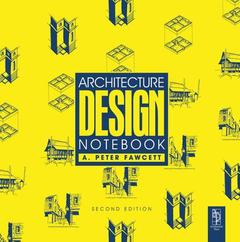Description
Architecture Design Notebook (2nd Ed.)
Author: Fawcett A Peter
Language: English
Subject for Architecture Design Notebook:
Keywords
corbusier; inland; revenue; office; villa; savoye; peter; smithson; architectural; review; James Street; Milton Keynes Development Corporation; Richards Medical Research Building; Le Corbusier; Le Corbusier’s Villa Savoye; Inland Revenue Offices; Berthold Lubetkin; Centripetal Space; Centrifugal Space; Van Eesteren; Lewis Womersley; Kenzo Tange; Trombe Wall; Architectural Review; Villa Savoye; Energy Conservation; Virtual Building; Denys Lasdun; Thermal Chimneys; Paving Pattern; De Stijl; Lake Shore Drive Apartments; Powerful Visual Images; Derek Walker; De Construction
Publication date: 07-2016
· 21x21 cm · Hardback
Approximative price 28.23 €
Subject to availability at the publisher.
Add to cartPublication date: 03-2003
128 p. · 21x21 cm · Paperback
Description
/li>Contents
/li>Readership
/li>Biography
/li>Comment
/li>
Architecture Design Notebook focuses on the process of design as pragmatic and non-theoretical. Dealing systematically with the core design curriculum, it clearly demonstrates the skills required for designing at undergraduate level.
Providing students with fundamental maxims of design, and a framework within which they can approach their work, this book supports undergraduates as they learn to produce solutions to design challenges.
This vital design companion underpins the cornerstone of an architectural undergraduates' studies - studio design projects. With over 100 sketches included, the book inspires student's design ideas.
This updated edition includes new sections on green architecture, urban space typology, and the virtual building.
A. Peter Fawcett is an architect and critic who combines teaching with sporadic practice; he is currently Professor Emeritus of Architecture at the University of Nottingham and visiting Professor at the University of Lincoln. In recent years his work has been placed in architectural competitions and has been hung at the Royal Academy and Royal Ulster Academy.
Preamble
The Context for Design
Arriving at the Diagram
Responding to the Site
Choosing an Appropriate "Model"
Organising the Plan
Choosing Appropriate Technologies
How will it Stand up?
How is it Made?
Will it be Comfortable?
Will it be Green?;
How will it Look?
The Urban Context
Postscript: A Working Method




